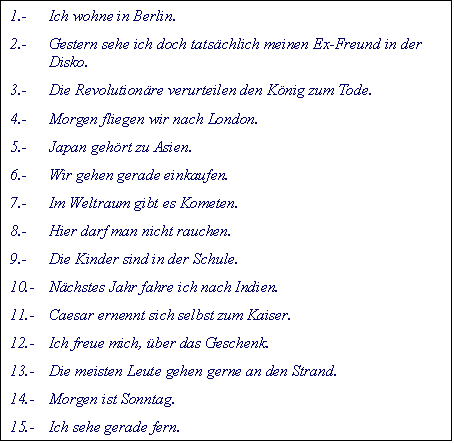The Present Functioning as The Future and The Past
a) Functioning as the future
In German, it is very popular to use the present in future sentences. When the present is used with a future value, it is normally introduced by an adverb of time.
Examples:
| In zwei Jahren fange ich an zu studieren. |
| In two years time I'll start studying |
| - |
| Morgen gehen wir nicht ins Schwimmbad. |
| Tomorrow we're not going to the swimming pool. |
| - |
| Nächste Woche fangen die Ferien an. |
| Next week the holidays start. |
| - |
| In 20 Jahren bist du alt. |
| Within 20 years you will be old. |
b) Instead of the past
It is a stylistic way to make a past event sound more current. It is used in colloquial language, in literature and history books.
Examples:
b. 1.- In colloquial language:
| Gestern war ich in der Bank. Da sehe ich doch tatsächlich einen Überfall. |
| Yesterday I am in the bank. When I'm there, I suddenly see a hold up. |
b. 2.- In literary style:
| Alle hatten ihn gewarnt. Der Held reitet trotzdem durch die Wüste. |
| They had all warned him. In spite of this, the hero passes through the dessert on horseback. |
b. 3.- The historic present:
In history books, the present is the tense used with greatest frequency. However, the past simple is also used.
| Die Römer kämpfen bis zum Schluss. |
| The romans fight until the end. |
You could also say:
| Die Römer kämpften bis zum Schluss. |
| The romans fought until the end. |
---------------- oooo O oooo ----------------
Exercises
Indicate the meaning of the present simple in the following sentences:a) present, b) future, c) past, or d) general truths.
(Click on the box to see the answers; double click to return to the original position)


